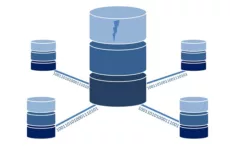Data resembles to water, costly to move, with numerous ways for storing it. Efficiently working with data is processing the location of data. But when thousands of sources come as data, it gets tricky in handling it. One solution to this is a data lake which refers to massive data collection at one place. This can store those thousands of sources and the user is left with one target for the data processing work. In addition, this unstructured data could be further utilized by data analysts and scientists for transforming and remodelling it to diversified data sets. This will provide convenience in further use.
Data Lake Supports Multiple Workloads & Distribution of Different Types & Sizes
Data Lake enables to enhance business agility, as it supports multiple workloads and distribution of various sizes and types. This helps scientists in centralising massive data in one logical storage pool from various applications. This may contain varied data including databases, audio, files and video. A major factor driving the growth of the global data lakes market is cost reduction, as per a study by Future Market Insights (FMI). Data lakes directly ingest data in original format instead of shifting it to purpose-built data store. Transformation and analysis of data can be done there itself, reducing the cost and necessity of a different server for transformation of data, in turn solving the challenge faced from Big Data. Big Data generates information that is highly diverse in nature. Data Lake’s ability of storing huge amount of data in various forms helps to tackle this problem. However, slow on-boarding and integration of data, and high post boarding & maintenance cost are some factors which keeps some organisations from adopting data lakes, which in-turn is expected to restrain the market growth in the near future.
Benefits of Data Lake
Data forms the lifeblood of most of the modern organisations. It enables them to meet compliance regulations, increase ROI, increase business agility, and better understand & serve their customers. This has led more businesses to realise value of mastering their data in the centralised data lake, for its quick analysis and access. The modern data architecture aims to timely turn raw data into insights while maintaining compliance & security standards, governance, and increasing efficiencies & nimbleness in the business. For achieving these goals, companies need to make investments in populating Data Lake and prevent its turning into data swamp. To ensuring the shift of all critical data assets into Data Lake and data’s good quality, organisations are investing necessary resources and time and are reaping benefits. These include
- With a complete analysis on their history and status, organisations are enables to improve customer loyalty. This renders easy provision of personalised information for best serving to customer needs.
- Organisations gain insights into customer’s appetite for risk, demographics, product preferences and more, leading to new revenue sources through marketing and cross-selling programs. This helps the organisations in targeting right customers with right offers.
- Organisations are able to accelerate and maintain regulatory compliance, reinforce credibility pertaining to regulations by establishing processes for sound data governance, and seamlessly gaining, accessing and validating insight from across the organisation into critical information.
- Exact real-time valuable information is accessible to organisations, which helps them in internal decision making and improving marketplace awareness.
- With the emergence of new data sources each day, organisations must focus on mastering their Data Lake for reaping benefits from every incoming customer data to unveil new insights & blow away the competition.
Teradata’s New Data Lake Management Software Platform
One of the leading data management solutions provider, Teradata, recently made an announcement on introducing a Data Lake management software platform, constructed by utilising capabilities of latest open source such as Apache Spark, Apache Hadoop, and Apache NiFi. This platform, called Kylo, is to help organisations to address most common challenges faced in Data Lake implementation efforts. No coding is required in Kylo. Its intuitive interface accelerates the development process. It also leverages reusable templates for increasing productivity.
Author: Abhishek Budholiya is a tech blogger, digital marketing pro, and has contributed to numerous tech magazines. Currently, as a technology and digital branding consultant with Future Market Insights, he offers his analysis on the tech market research landscape. His forte is analysing the commercial viability of a new breakthrough, a trait you can see in his writing. When he is not ruminating about the tech world, he can be found playing table tennis or hanging out with his friends.








